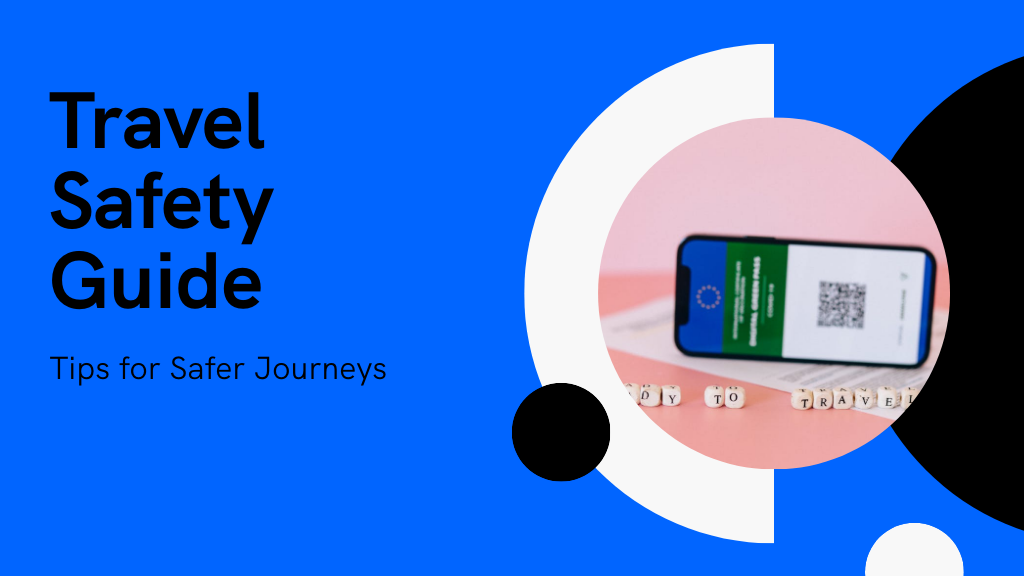
When you travel, it's crucial to stay safe by being aware of your surroundings and researching your destination. Familiarize yourself with local customs, avoid risky neighborhoods, and keep your belongings secure. Make copies of important documents and store them separately. Trust your instincts about people and places. Finally, stay informed about local laws to avoid misunderstandings. There's much more to discover about enhancing your travel experience and ensuring your safety on the road.
Key Takeaways
- Stay informed about your destination's safety, including crime rates and areas to avoid, to make informed travel decisions.
- Secure important documents by making copies and storing them separately from originals, ensuring easy access in emergencies.
- Use reliable transportation options and familiarize yourself with local transit systems to navigate confidently and safely.
- Keep a discreet money pouch for cash and cards, and split your cash to minimize risks of theft.
- Engage with local customs and laws to foster goodwill and avoid misunderstandings that could lead to conflict.
Understanding Travel Risks
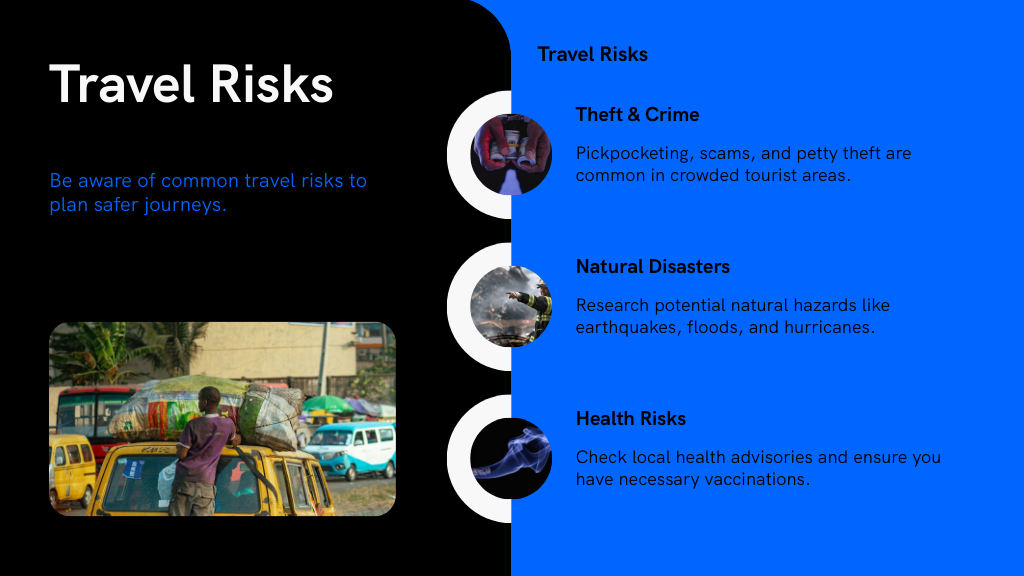
When you think about traveling, how often do you consider the potential risks involved? Understanding travel risks is essential for ensuring your journey is as enjoyable as it's safe.
From pickpocketing in crowded markets to natural disasters, risks can lurk in every corner. To enhance your travel safety, familiarize yourself with common hazards at your destination.
Always keep your belongings secure and be aware of your surroundings. Utilize travel safety tips like avoiding poorly lit areas and using reliable transportation.
Researching Your Destination
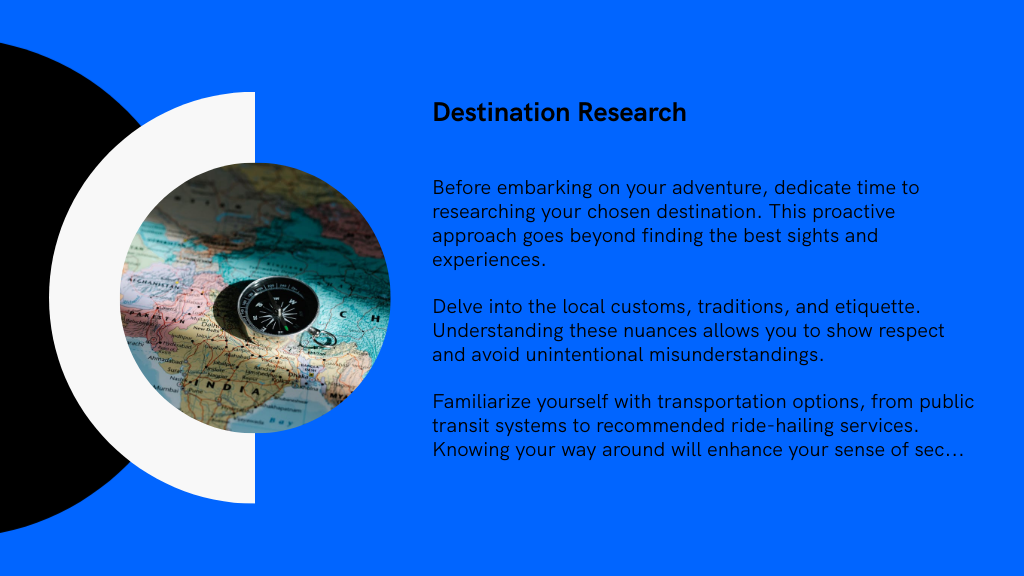
Taking the time to research your destination can greatly enhance your travel experience and safety. Start by exploring the local customs, traditions, and etiquette—this will not only enrich your understanding but also show respect to the locals. Familiarize yourself with the area's transportation options, so you can navigate confidently. Look into the safety of neighborhoods, and identify any areas to avoid.
Check out local health advisories, including food and water safety. Engaging with travel forums and social media can connect you with fellow travelers who might share valuable insights. Finally, learn a few basic phrases in the local language; it can foster connections and make you feel more at home. A little research goes a long way in ensuring a memorable trip!
Securing Important Documents
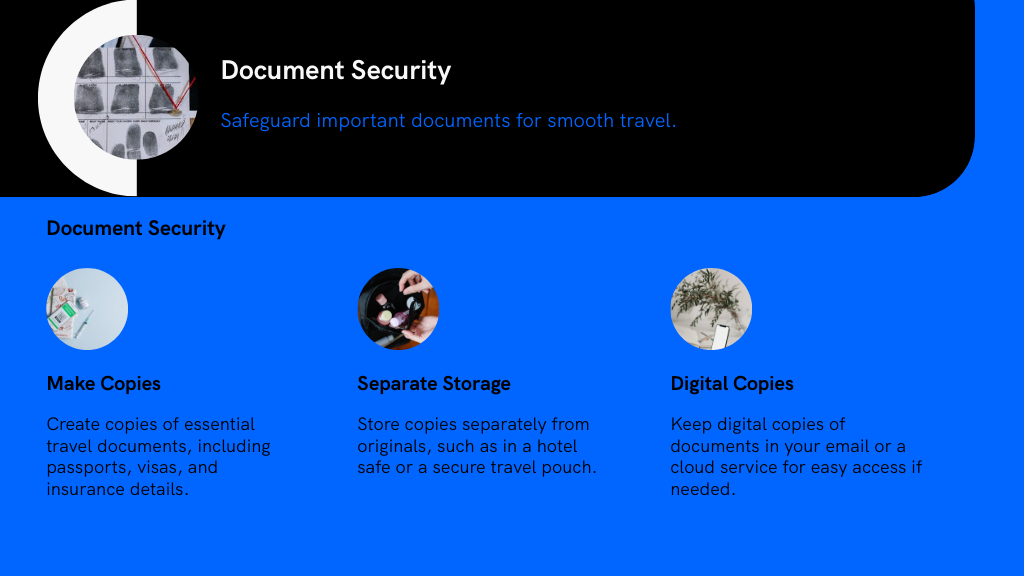
Securing important documents is a critical step that can save you a lot of hassle during your travels. Start by making copies of your passport, visa, ID, and any travel insurance documents. Keep these copies in a separate location from the originals, like a hotel safe or a secure travel pouch.
It's also smart to store digital copies in your email or a cloud service, giving you easy access if needed. Consider using a travel wallet or neck pouch to keep your documents organized and close to you. Be mindful of your surroundings when accessing these documents, especially in crowded places.
Choosing Safe Accommodations
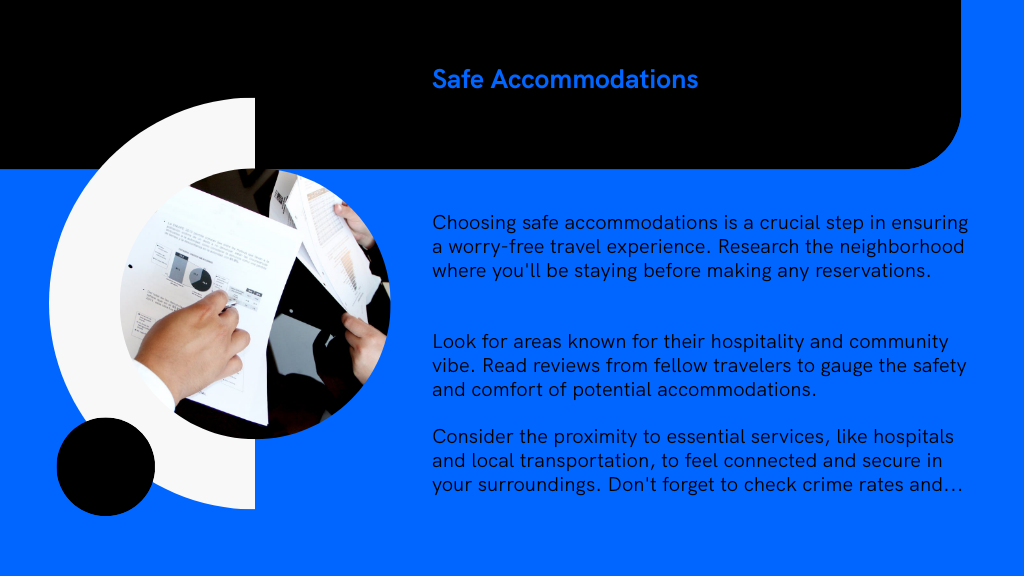
When picking a place to stay, it's crucial to research the safety of the neighborhood. Look for accommodations that highlight their security features, like well-lit entrances and surveillance cameras. A little extra effort in your choice can go a long way in ensuring a worry-free stay.
Research Location Safety
As you plan your trip, choosing safe accommodations can greatly enhance your overall travel experience. Start by researching the neighborhood where you'll stay. Look for areas known for their hospitality and community vibe. Read reviews from fellow travelers to gauge safety and comfort. Websites like TripAdvisor and Airbnb can provide insights into the experiences of others.
Consider the proximity to essential services, like hospitals and local transportation. You'll want to feel connected and secure in your surroundings. Don't forget to check the crime rates and overall reputation of the area. By taking these steps, you're not just finding a place to sleep; you're creating a welcoming home base for your adventures, ensuring you feel at ease during your travels.
Check Security Features
Before finalizing your accommodation choice, it's essential to examine the security features offered. Look for well-lit entrances and hallways, as good lighting can deter unwanted attention. Check if the property has secure locks on doors and windows, and inquire about key card access. A reliable accommodation often has a 24-hour front desk or security personnel, ensuring help is always nearby.
If you're considering shared spaces, assess the safety measures in place, like lockers for your belongings. Don't hesitate to read reviews from fellow travelers, as their experiences can reveal a lot about safety.
Prioritizing these security features can provide peace of mind, making your journey more enjoyable and allowing you to focus on creating unforgettable memories.
Packing Smart for Safety
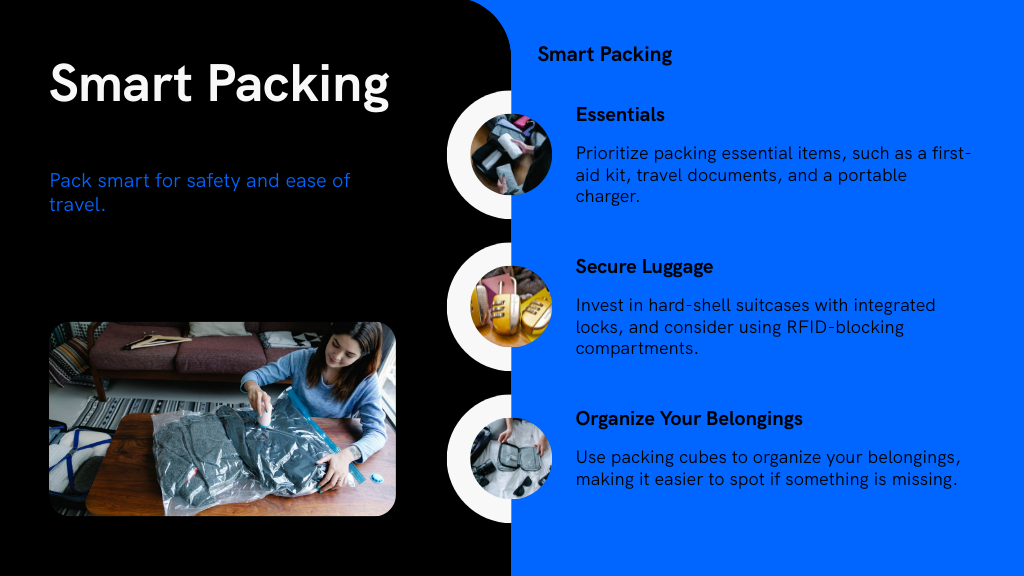
When packing for your trip, think carefully about the essentials you can't live without. Using secure luggage not only protects your belongings but also gives you peace of mind while you travel.
Prioritize Essential Items
Packing smart for safety means knowing what essential items to prioritize, especially since the right gear can make all the difference in your travel experience.
When planning your packing list, focus on these three must-haves:
- First Aid Kit: A compact kit with band-aids, antiseptic wipes, and pain relievers can be a lifesaver for minor injuries or ailments.
- Travel Documents: Keep copies of your passport, ID, and travel insurance in a secure location. Having these on hand can ease stress during unexpected situations.
- Portable Charger: Staying connected is vital. A portable charger guarantees that your devices remain powered, allowing you to access important information and stay in touch with loved ones.
Use Secure Luggage
Choosing the right luggage can greatly enhance your travel security. Opt for hard-shell suitcases with integrated locks, as they deter tampering and provide an extra layer of protection.
Look for bags with RFID-blocking compartments to keep your personal information safe from digital theft. When packing, use packing cubes to organize your belongings, making it easier to spot if something's missing.
Choose bright or distinctive colors for your luggage to avoid mix-ups and make it easier to spot on the carousel. Don't forget to label your bags with your contact information, but be cautious about displaying your address.
Staying Connected While Traveling
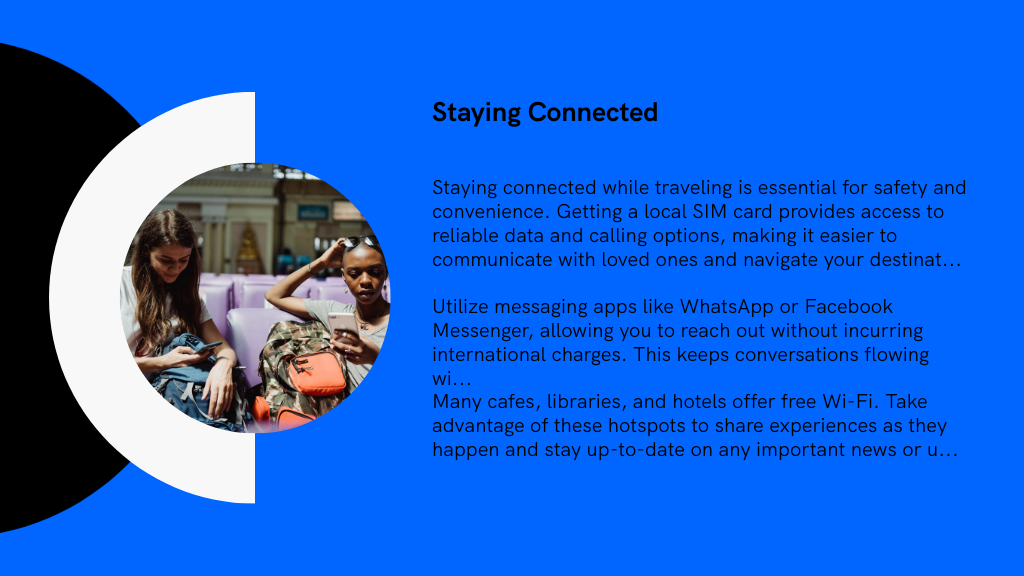
Staying connected while traveling is essential for both safety and convenience, and there are several effective ways to guarantee you don't feel isolated during your journey.
Here are three tips to help you stay in touch:
- Get a Local SIM Card: This gives you access to reliable data and calling options, making it easier to communicate with loved ones and navigate your destination.
- Use Messaging Apps: Apps like WhatsApp or Facebook Messenger allow you to reach out without incurring international charges, keeping conversations flowing with friends and family.
- Find Wi-Fi Hotspots: Many cafes, libraries, and hotels offer free Wi-Fi. Staying connected this way can help you share experiences as they happen.
Health Precautions and Vaccinations
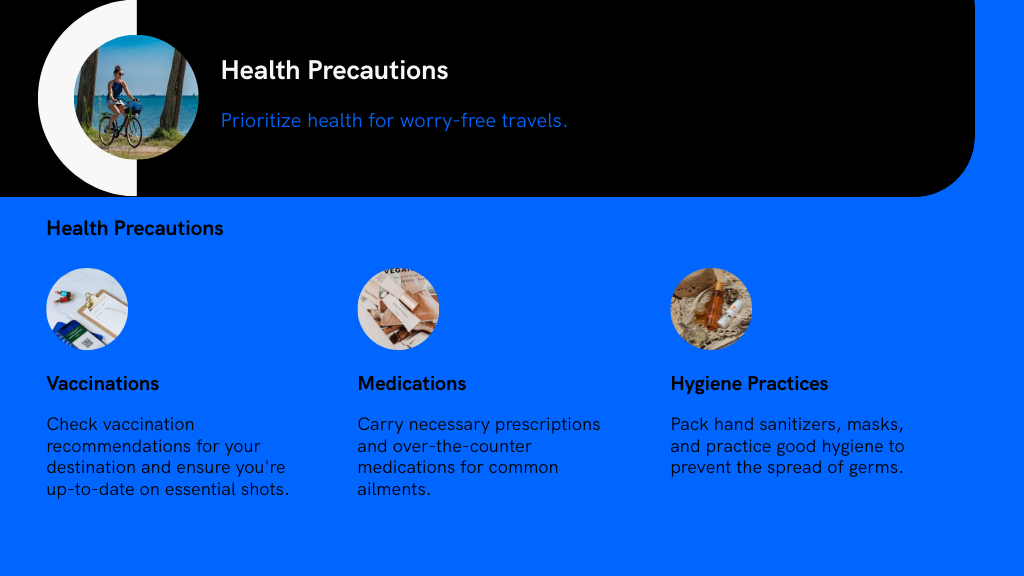
Before you commence your adventure, it's essential to know the vaccination recommendations specific to your destination. Taking preventative health measures can keep you feeling your best while exploring new places, and having travel insurance adds an extra layer of protection. Let's explore how to safeguard your health on the road.
Vaccination Recommendations by Destination
As you plan your next adventure, understanding the vaccination recommendations for your specific destination can greatly enhance your travel experience and safeguard your health. Different regions have unique health risks, so it's crucial to be informed.
Here are three key steps to take into account:
- Research Destination-Specific Vaccines: Some locations may require vaccines for diseases like yellow fever or hepatitis A. Make sure you know what's needed.
- Consult a Healthcare Professional: Speak with your doctor or a travel clinic to get personalized advice based on your medical history and destination.
- Stay Updated on Health Alerts: Check for any travel advisories or outbreaks in your destination country to verify you're well-prepared.
Taking these steps can help you enjoy your travels worry-free!
Preventative Health Measures
While traveling to new destinations can be exciting, it's essential to prioritize your health by taking preventative measures. Before you set out on your journey, consider necessary vaccinations and health precautions tailored to your destination. Staying informed can make all the difference.
| Precaution | Description | When to Take Action |
|---|---|---|
| Vaccinations | Confirm you're up-to-date on shots | 4-6 weeks before travel |
| Medications | Carry necessary prescriptions | Before leaving home |
| Health Check-ups | Schedule a visit to your doctor | 1 month prior |
| Travel Insurance | Protect against unexpected costs | Before booking |
| Hygiene Practices | Pack sanitizers and masks | Throughout your trip |
Taking these steps guarantees you can focus on enjoying your adventure while minimizing health risks. Safe travels!
Travel Insurance Importance
Travel insurance is more than just a safety net; it's an essential investment that can save you from significant financial burdens when unexpected health issues arise during your trip. You never know when a minor illness or an accident can turn into a major headache. Here are three reasons why travel insurance is vital:
- Medical Coverage: It guarantees you have access to necessary medical treatments without worrying about costs.
- Emergency Evacuations: If you need to be transported to a better facility, insurance can cover those expenses.
- Trip Cancellation Protection: If you have to cancel due to health issues, it can reimburse your non-refundable costs.
Transportation Safety Tips
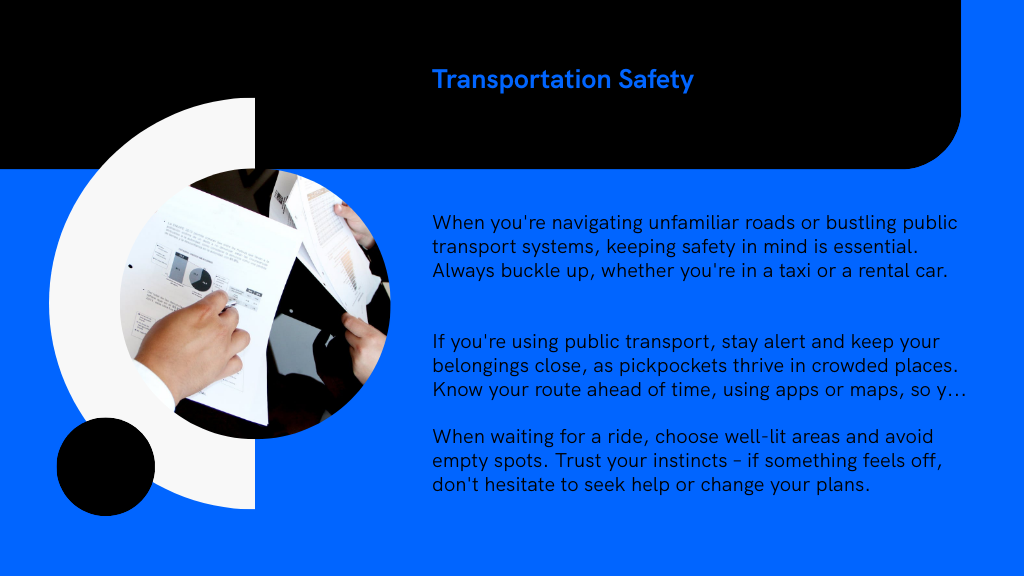
When you're traversing unfamiliar roads or bustling public transport systems, keeping safety in mind is essential. Always buckle up, whether you're in a taxi or a rental car. If you're using public transport, stay alert and keep your belongings close; pickpockets thrive in crowded places. Know your route ahead of time, using apps or maps, so you're not distracted.
When waiting for a ride, choose well-lit areas and avoid empty spots. Trust your instincts—if something feels off, don't hesitate to seek help or change your plans. Finally, make sure your phone is charged and has emergency numbers saved, just in case. By taking these precautions, you'll not only protect yourself but also enjoy your adventure with peace of mind.
Managing Money and Valuables

Managing your money and valuables effectively can make a significant difference in your travel experience, especially in unfamiliar places.
Here are some essential tips to keep your belongings safe:
- Use a Money Belt: Invest in a discreet money belt or pouch that you can wear under your clothes. It keeps your cash and cards secure from pickpockets.
- Diversify Your Cash: Don't keep all your money in one place. Split cash between your wallet, hotel safe, and a hidden spot, so you're covered if you lose one stash.
- Limit Valuables: Leave expensive jewelry and electronics at home. If you must bring them, use a hotel safe to keep them secure.
Communicating With Locals
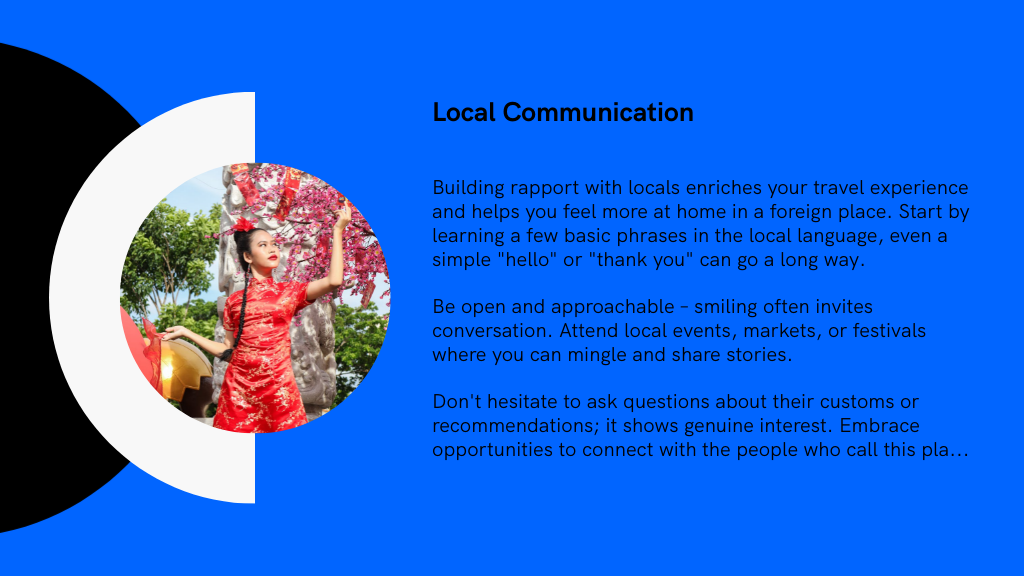
How can you connect with locals while traveling? Building rapport with the people you meet can enrich your experience and help you feel more at home in a foreign place.
Start by learning a few basic phrases in the local language; even a simple "hello" or "thank you" can go a long way. Be open and approachable—smiling often invites conversation.
Attend local events, markets, or festivals where you can mingle and share stories. Don't hesitate to ask questions about their customs or recommendations; it shows genuine interest.
Emergency Contacts and Plans
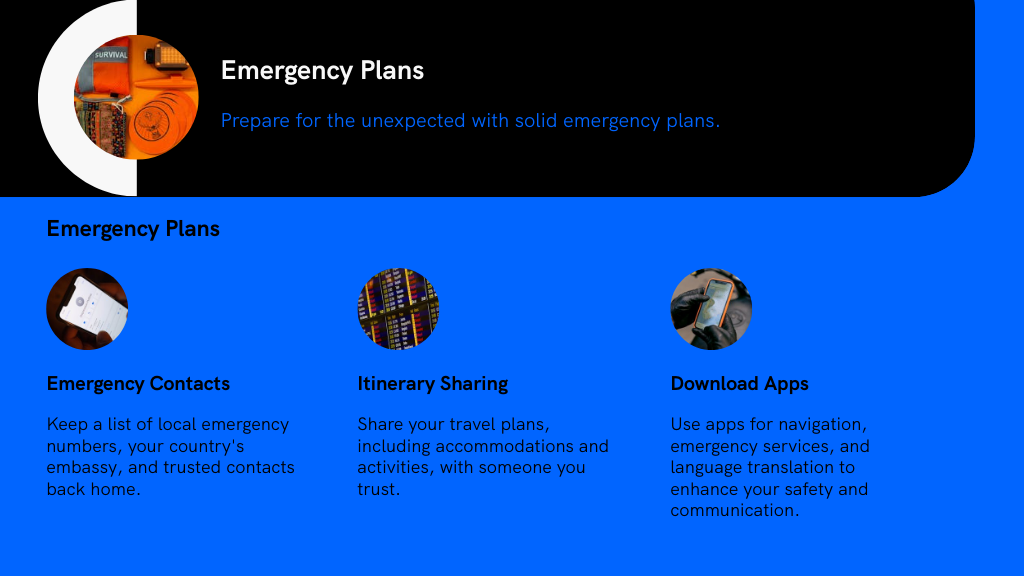
In the whirlwind of travel, having a solid plan for emergencies can be your lifeline. You never know when a situation might arise, so it's vital to prepare in advance.
Here are three essential steps to guarantee you're ready:
- List Emergency Contacts: Keep a list of local emergency numbers, your country's embassy, and trusted contacts back home.
- Share Your Itinerary: Let someone know your travel plans, including accommodations and activities. This way, they can help if something goes awry.
- Download Important Apps: Use apps for navigation, emergency services, and language translation to help you feel secure and connected.
Staying Aware of Your Surroundings
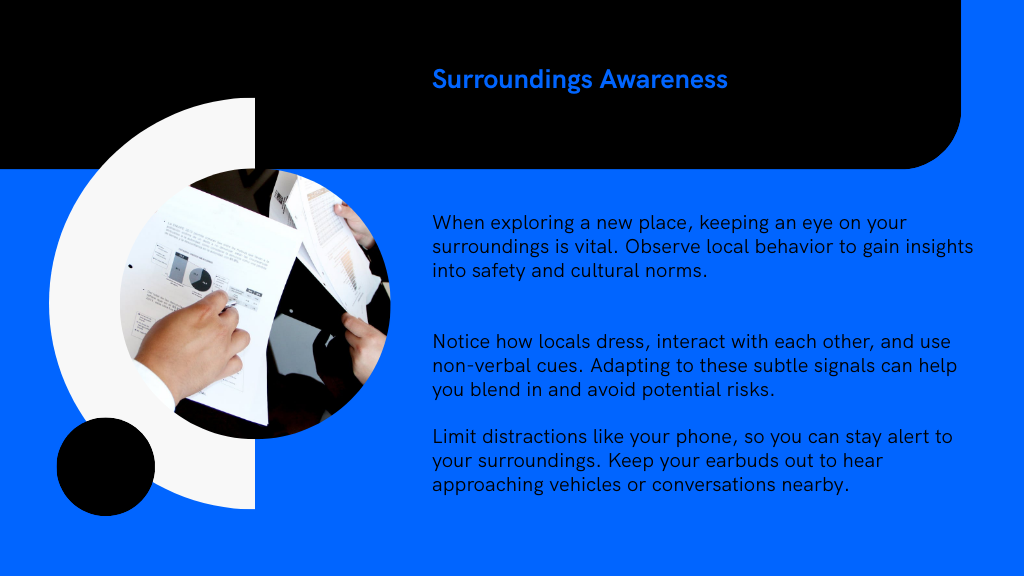
When you're exploring a new place, keeping an eye on your surroundings is vital. Observing local behavior can give you important cues about safety and cultural norms, while limiting distractions like your phone helps you stay alert.
Observe Local Behavior
As you navigate unfamiliar surroundings, paying attention to local behavior can be your best defense against potential dangers. Observing how locals interact can help you blend in and stay safe. Here are three key behaviors to watch for:
- Dress Codes: Notice how locals dress. Adapting your attire can help you avoid unwanted attention.
- Social Norms: Pay attention to greetings and interactions. Understanding local customs fosters respect and connection.
- Body Language: Observe the way people communicate non-verbally. This can signal comfort levels and potential threats.
Limit Distractions While Walking
While wandering through new streets can be exhilarating, it's vital to keep distractions at bay to stay aware of your surroundings. Your phone might be buzzing with notifications, but resisting the urge to scroll is important.
Instead, take in the sights, sounds, and smells around you. Notice the local architecture, the laughter of children playing, or the aroma of street food wafting through the air. By staying present, you not only enjoy your journey but also enhance your safety.
Keep your earbuds out, so you can hear approaching vehicles or conversations nearby. Trust your instincts and stay alert; this way, you can fully immerse yourself in the experience and connect with the vibrant culture around you.
Safe travels!
Using Technology Wisely
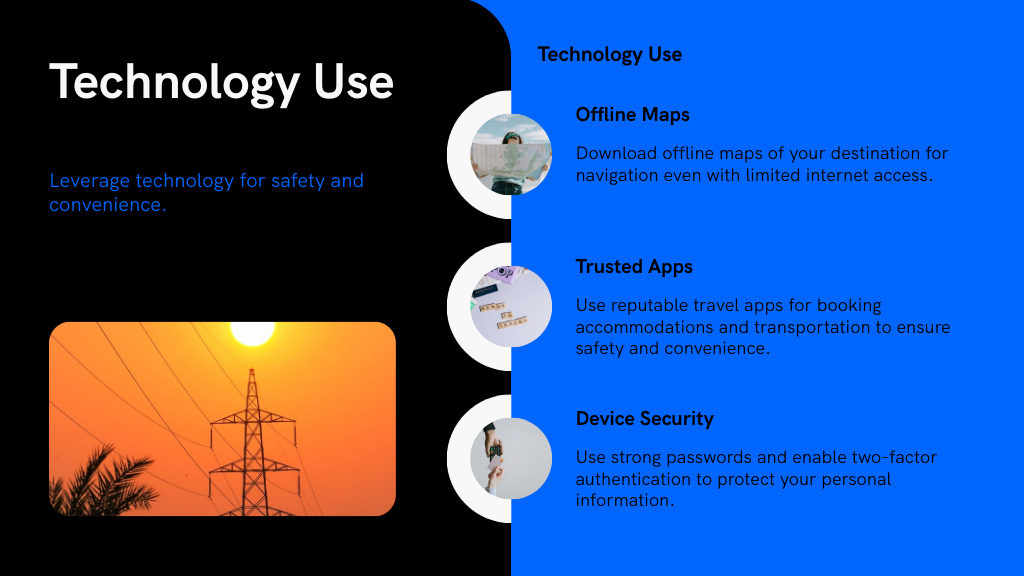
In our tech-driven world, using technology wisely can greatly enhance your travel experience and keep you safe.
Here are three essential tips to make the most of your devices:
- Download Offline Maps: Before you head out, download maps of your destination. This will help you navigate without relying on data, especially in areas with poor reception.
- Use Trusted Apps: Stick with reputable travel apps for booking accommodations and transportation. They often have safety features, reviews, and customer support.
- Keep Your Devices Secure: Use strong passwords and enable two-factor authentication. This protects your personal information in case of theft.
Trusting Your Instincts
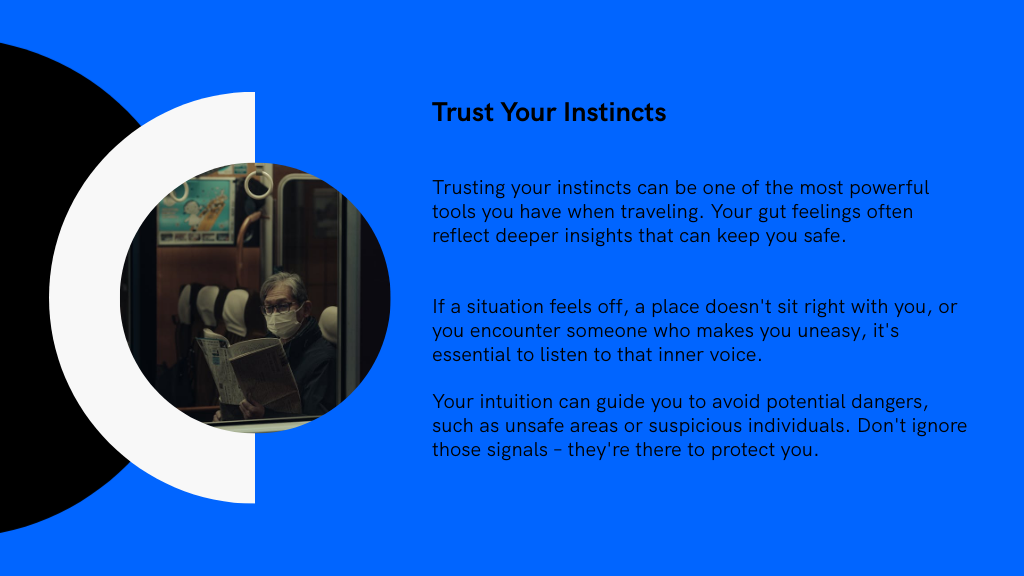
Trusting your instincts can be one of the most powerful tools you have when traveling. Your gut feelings often reflect deeper insights that can keep you safe. If a situation feels off or a place doesn't sit right with you, it's essential to listen.
| When to Trust Your Instincts | Example Situations |
|---|---|
| Uncomfortable surroundings | Dark alleys late at night |
| Suspicious individuals | People loitering near your path |
| Ignoring warning signs | Local advice suggesting caution |
| Overly friendly strangers | Unsolicited help in crowded areas |
| Feeling pressured | Quick decisions in markets |
Being attuned to your instincts fosters a deeper connection with your travel experiences, ensuring safety and enhancing your journey. Remember, your feelings matter—trust them!
Staying Informed About Local Laws and Customs
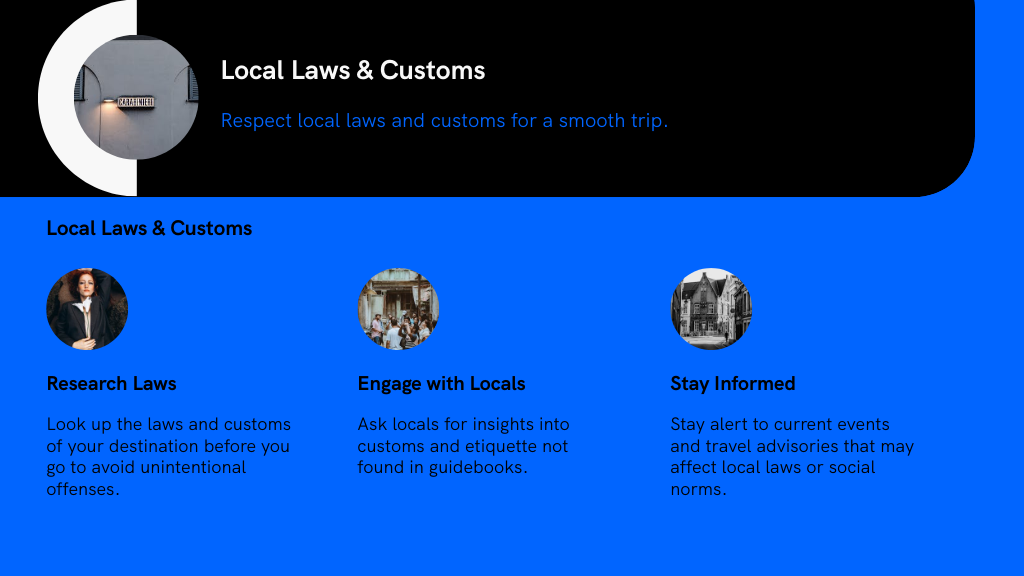
Understanding local laws and customs is essential for a smooth and enjoyable travel experience, as it not only helps you avoid legal troubles but also fosters respect for the culture you're visiting.
Here are three key tips to keep in mind:
- Research Before You Go: Look up the laws and customs of your destination to avoid unintentional offenses, from dress codes to public behavior.
- Ask Locals: Engage with residents or local guides to gain insights that aren't always found in travel books. They can offer valuable advice on acceptable behavior.
- Stay Alert: Keep an eye on current events and any travel advisories. This can help you adapt quickly to any changes in local laws or social norms.
Conclusion
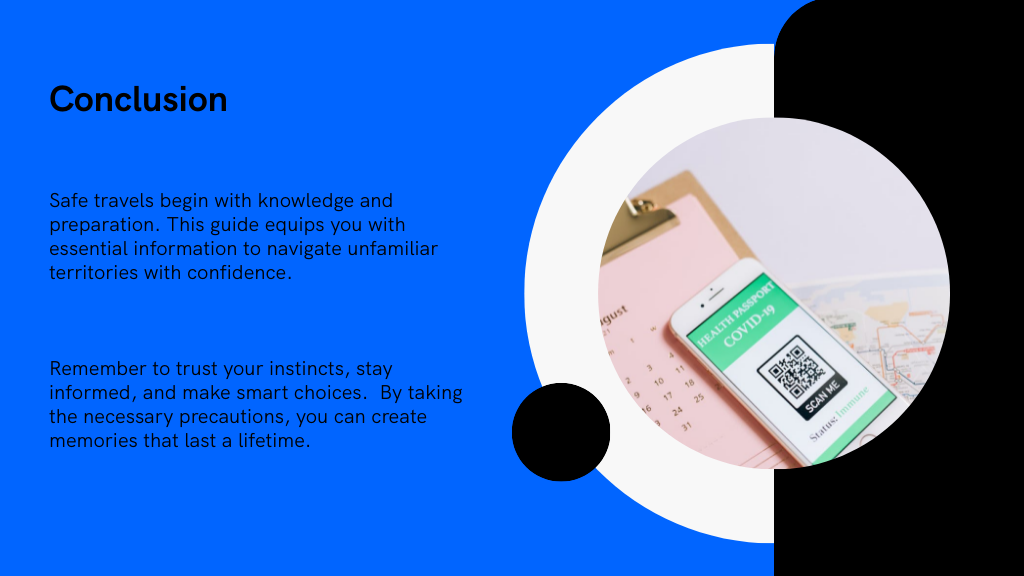
As you commence your journey, remember that safety is your compass, guiding you through uncharted waters. By staying informed and prepared, you can turn potential pitfalls into stepping stones. Trust your instincts like a lighthouse in the fog, illuminating the path ahead. Embrace the thrill of exploration, knowing you've armed yourself with essential knowledge. With each step, let adventure and caution dance hand in hand, ensuring your travels are not just safe, but unforgettable.

